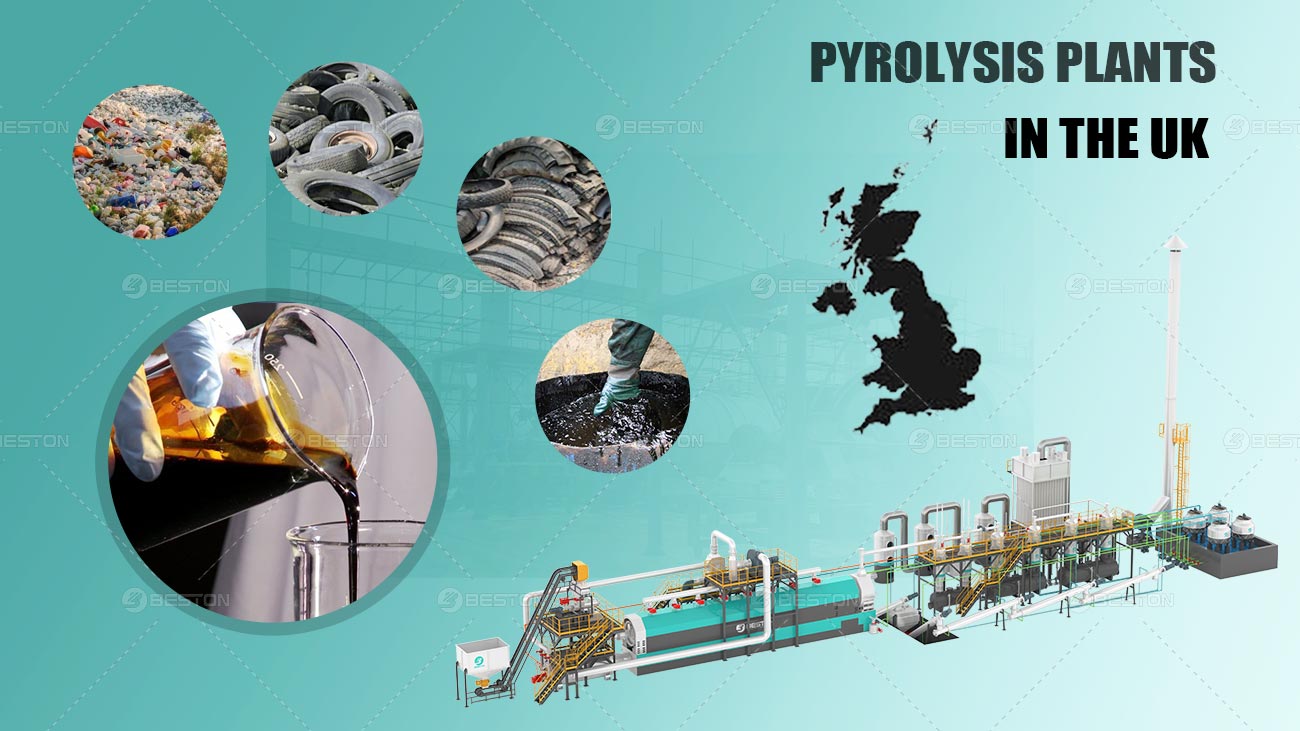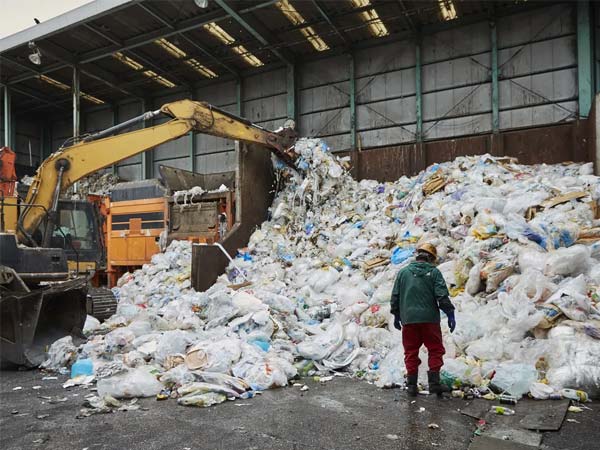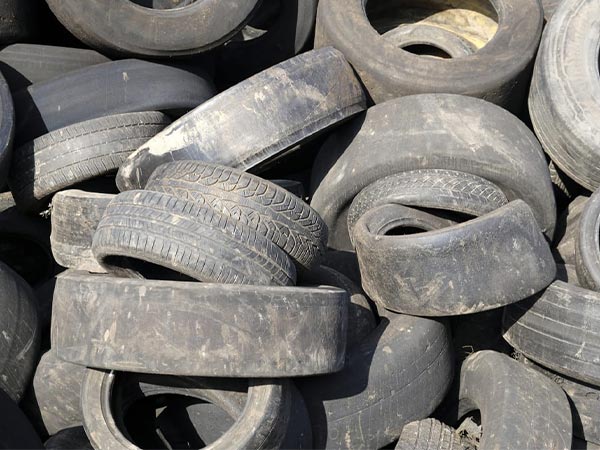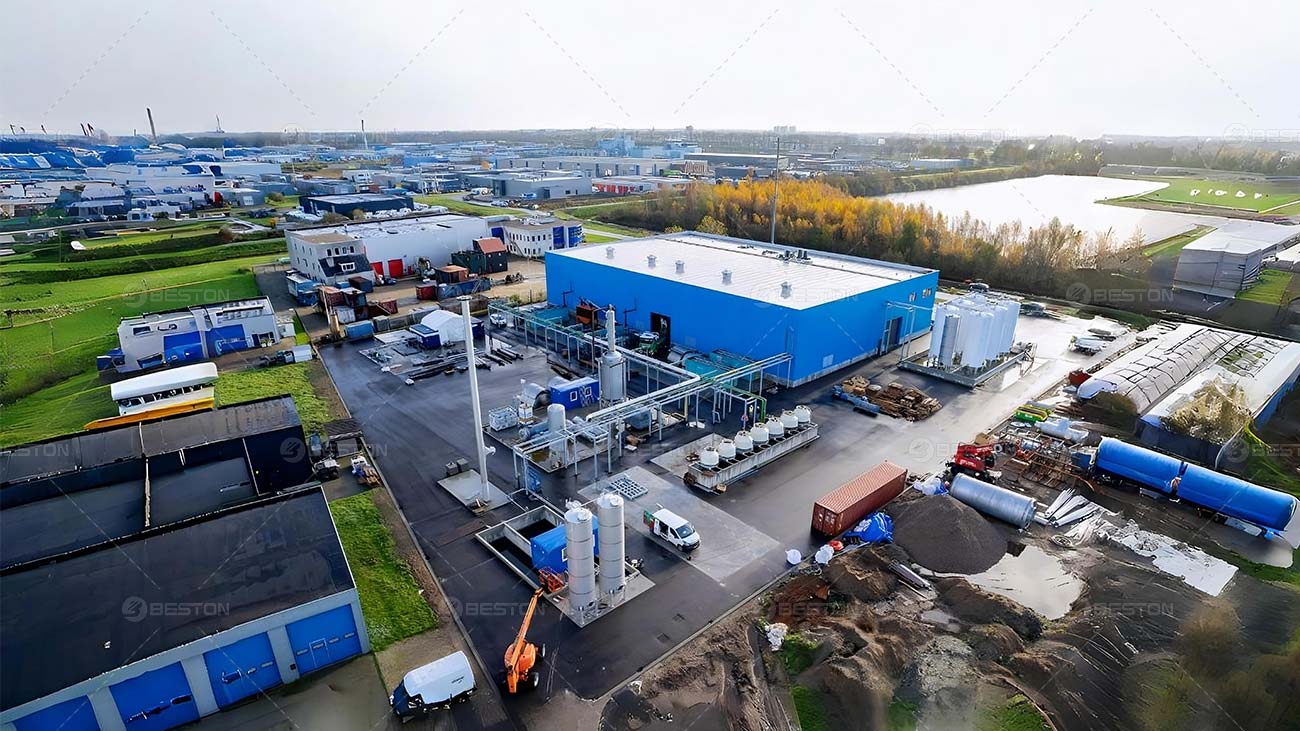The establishment of pyrolysis plants in the UK aims to achieve the reduction, resource utilization, and harmless treatment of local waste plastics, tires, and oil sludge. Currently, Beston Group has a set of tyre pyrolysis plant in the UK in operation. We aspire to further extend our pyrolysis expertise to the UK market. We hope to offer sustainable solutions for local waste recycling.

Customer Instance: 12-16T/D Tyre Pyrolysis Plant in the UK
Project Information
- Location: UK;
- Raw material: waste tyres;
- Model: BLJ-16;
- Daily capacity: 12-16t/d;
- Working method: batch.
Cooperation Details – Our one-stop service
Our cooperation with British customers is progressing smoothly, thanks to our comprehensive one-stop service system. This system has played a pivotal role in advancing the project, covering various stages:
- Contact and communicate with the customer;
- Customize solutions based on client requirements;
- Customer visits Beston factory for inspection
- Confirm project details and cooperation;
- Contract signing & Payment;
- Factory production of equipment according to plan;
- Customer inspection;
- Transport pyrolysis plant to the UK;
- Arrange engineers to the UK upon arrival of goods;
- Install pyrolysis plants in the UK;
- Train operating workers;
- Machine trial operation;
- Successfully produce oil;
- Receive feedback from the customer.
Feedback from the UK customer
When the BLJ-16 waste pyrolysis plant in the UK ran smoothly and successfully converted waste tires into pyrolysis oil, we received feedback from our British customer. He said, “I am excited now. Thanks for all that Beston has done for us. They helped us a lot, and finally we succeeded. I appreciate both Beston’s products and service. Thank you, Beston!” This positive feedback motivates us to continue delivering exceptional products and services, contributing to sustainable waste management practices in the UK and beyond.

Explore How Pyrolysis Plant in the UK Works
Acceptable Raw Materials for Pyrolysis
Pyrolysis plants in the UK is usually used to process the following waste materials:

In 2023, the total consumption of short-lifespan plastics in the UK exceeded 2 million tons, prompting an urgent need for their disposal. Beston Group is able to establish plastic pyrolysis plant in the UK to process plastics such as PP, PE, PS, and ABS (Note: PET and PVC are not accepted).

Around 55 million waste tires are generated in the UK every year, posing a significant environmental challenge. Our advanced pyrolysis technology can efficiently convert scrap tires or rubber into fuel oil and carbon black, offering a sustainable alternative to landfill disposal.

By 2024, the UK has found around 298 million metric tonnes of oil reserves, mostly in the North Sea. Over 280 offshore oil and gas fields are active there, with an expected total production of 5.25 billion barrels of oil equivalent by 2050. As oil exploitation continues, significant amounts of oily sludge need pyrolysis technology for safe disposal.
Pyrolysis Contributes to the UK’s Green Circular Economy
The UK Government has placed a growing focus on the transition towards the circular economy. The handling of waste plastic and tires is a crucial aspect of the transition to a circular economy. Here are some developments in this aspect.
- In 2018, the UK Government set a strategic ambition to “…work towards all plastic packaging placed on the market being recyclable, reusable or compostable by 2025.”
- In January 2023, the UK Government published Environmental Improvement Plan 2023. It set a target that residual municipal plastic waste does not exceed 42 kg per capita annually, by 31 January 2028. Residual waste is waste that is sent to landfill, put through incineration or used in energy recovery in the UK or overseas.
- In 2023, DEFRA in the UK published a new waste reduction policy aimed at significantly reducing nationwide waste by 2030. Specific aims include: cutting total waste generation by 15% from current levels; phasing out landfill usage for all recyclable waste, etc. To drive progress towards its 2030 targets, DEFRA’s UK waste reduction policy introduces tougher regulations around waste, such as banning recyclable materials from landfills and incinerators by 2025. These regulations will force businesses and consumers to think harder about waste recycling. The landfill and incineration bans will make recycling the only option for materials like paper, and certain plastics. DEFRA has committed to investing over £1 billion to develop local waste management infrastructure.
- Under the Landfill Regulation Act (2002) whole tires are banned from being dumped in U.K. landfill sites. Under the EU Landfill Directive (2006) this was extended to include end-of-life and shredded tires from being dumped in U.K. landfill sites. This forces systems to be put in place to recycle them.
- In April 2024, the Tyre Recovery Association (TRA) continued to press the UK Government for action to address the misuse of end-of-life whole tyres exported from the UK. Since 2006, it has been prohibited to dispose of waste tires in landfills, leading the UK to frequently export waste tires to countries like India. However, this practice contributes to an increased carbon footprint during transportation and raises the costs of tire recycling. Therefore, establishing pyrolysis plants in the UK domestically is a viable solution.
By integrating pyrolysis technology into the UK’s waste management infrastructure, the country can significantly reduce the volume of waste tire and plastic. The produced pyrolysis oil can be used as fuel in plastic-related and tire-related industries, contributing to the development of a more sustainable circular economy in the UK.
Considerations for Starting a Pyrolysis Project in the UK
Starting a pyrolysis project in the UK requires careful consideration of various factors, including:
- Regulatory compliance: It is essential to adhere to UK environmental regulations and obtain necessary permits and approvals before commencing operations.
- Market demand: Conducting market research to assess the demand for pyrolysis products, such as fuel oil and carbon black, is crucial for ensuring the project’s viability.
- Investment feasibility: Assessing the project’s financial feasibility, including initial investment costs, operational expenses, and potential revenue streams, is essential for making informed decisions.
- Environmental impact: Evaluating the environmental impact of the pyrolysis project and implementing measures to minimize emissions and ensure sustainable operations is critical for gaining public and regulatory support.

Why Recommend Beston Pyrolysis Plant?
Beston Group’s pyrolysis plants offer numerous advantages, including:
- Innovative technology: Our scheme of waste tire pyrolysis plant combined with distillation enables the component separation of non-standard gasoline and non-standard diesel. This realizes the classification, quality and high value-added utilization of products. We have independently developed the waste plastic catalytic pyrolysis technology to solve the technical problem of wax clogging in plastic pyrolysis. Our fully continuous pyrolysis technology can realize continuous, efficient, safe and automated operation of equipment. This helps to reduce energy consumption and improve human efficiency.
- Environmental sustainability: To minimize environmental impact, our machine is designed with an advanced emission control system and syngas recycling system. The machine’s ISO14001 certification further validates this commitment to eco-friendliness.
- Customized solution: We offer a variety of pyrolysis plant models and configurations customizable to suit specific requirements. Whether it’s the feeding system, pyrolysis reactor, dedusting system, or others, customers in the UK can expect personalized solutions.
- Safety insurance: We adhere to a people-oriented approach, incorporating multiple internal safety designs to ensure the safe and harmless operation of the equipment.
- Professional support: From project planning to after-sales service, our dedicated team provides comprehensive support at every stage of the project, just as mentioned in the above-mentioned UK project.
Welcome to Cooperate with Beston Group
If you’re considering establishing pyrolysis plants in the UK, contact Beston Group today. Our experienced team will work with you to develop a customized solution that meets your needs. Together, we can transform waste into valuable fuel resources and contribute to a more sustainable future for the United Kingdom.
